Echology Poetry Walk
July - November 2021Gig Harbor, WAEverything we do creates a ripple, an echo that reverberates through the environment.
ECHOLOGY highlights the autumn return of salmon to our local waters, honoring the process through art. Poems by regional poets are installed along the Donkey Creek trail, an invitation for visitors to explore the ancient spawning grounds. By bringing together a variety of voices on the Salish Sea's habitat the public has the opportunity to explore different perspectives, learn about the salmon life cycle and the health of our waters.
Plaques are placed throughout Gig Harbor's Donkey Creek Park, Harbor History Museum and Austin Estuary Park encouraging a contemplative nature walk. ECHOLOGY culminates at the Donkey Creek Chum Festival in November where selected poets will read their poems.
Coast Salish, the indigenous people of the Pacific Northwest Coast, are forever intertwined with these magnificent fish by traditions and for sustenance. To read more about the relationship between Coast Salish tribes and salmon, click here.
“Historically, first-salmon ceremonies differed from tribe to tribe, but all had some things in common. The salmon chief of the tribe would select a fisher to catch the first salmon. This was an honor, and before entering the river the fisher would undergo a blessing or a purification. Once a fish was caught, it would be brought to shore and carefully prepared, cooked and distributed to the people in a manner unique to the location and tribe. The head of the fish would be kept pointed upriver to show the salmon’s spirit the way home.”

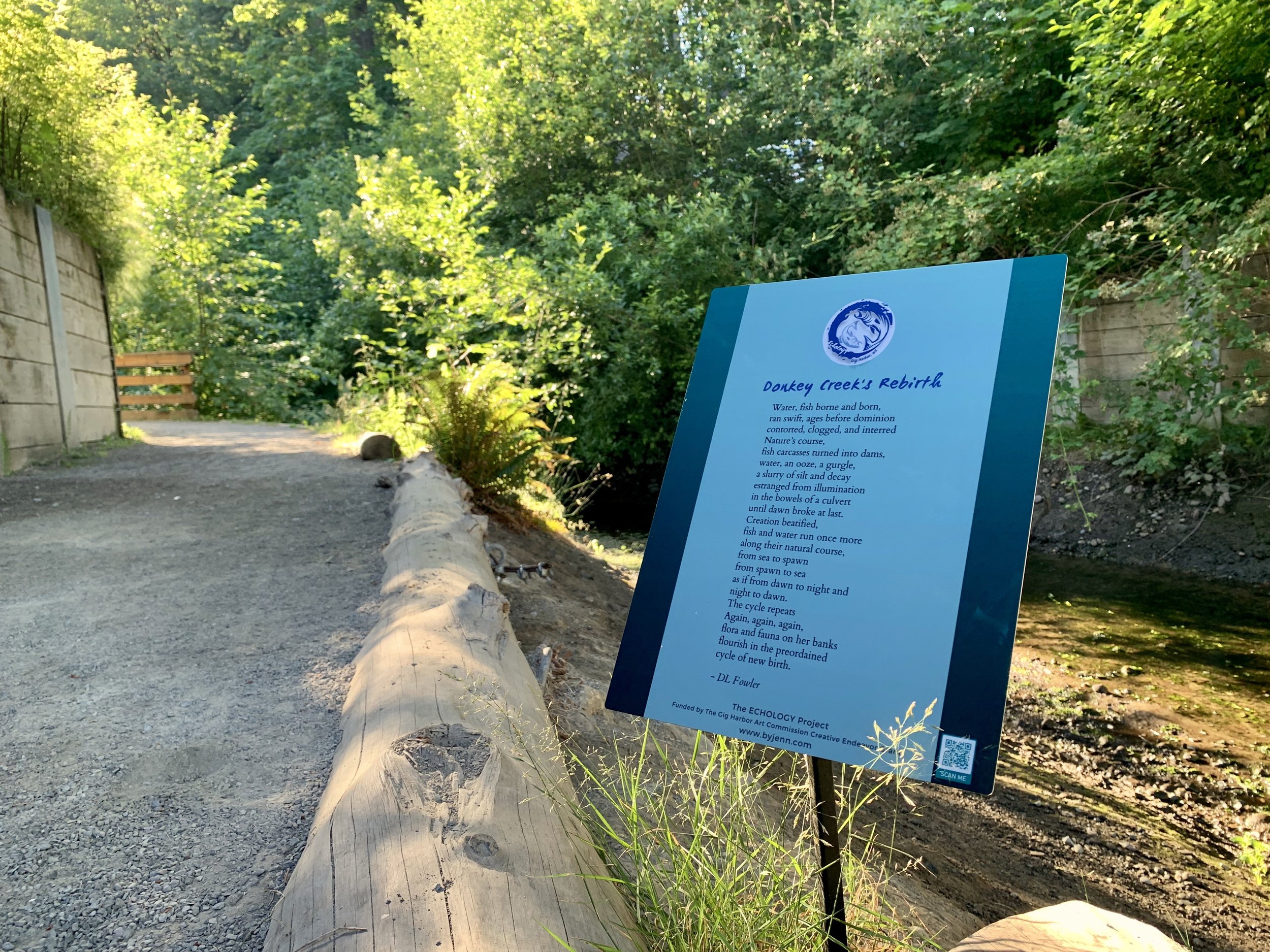
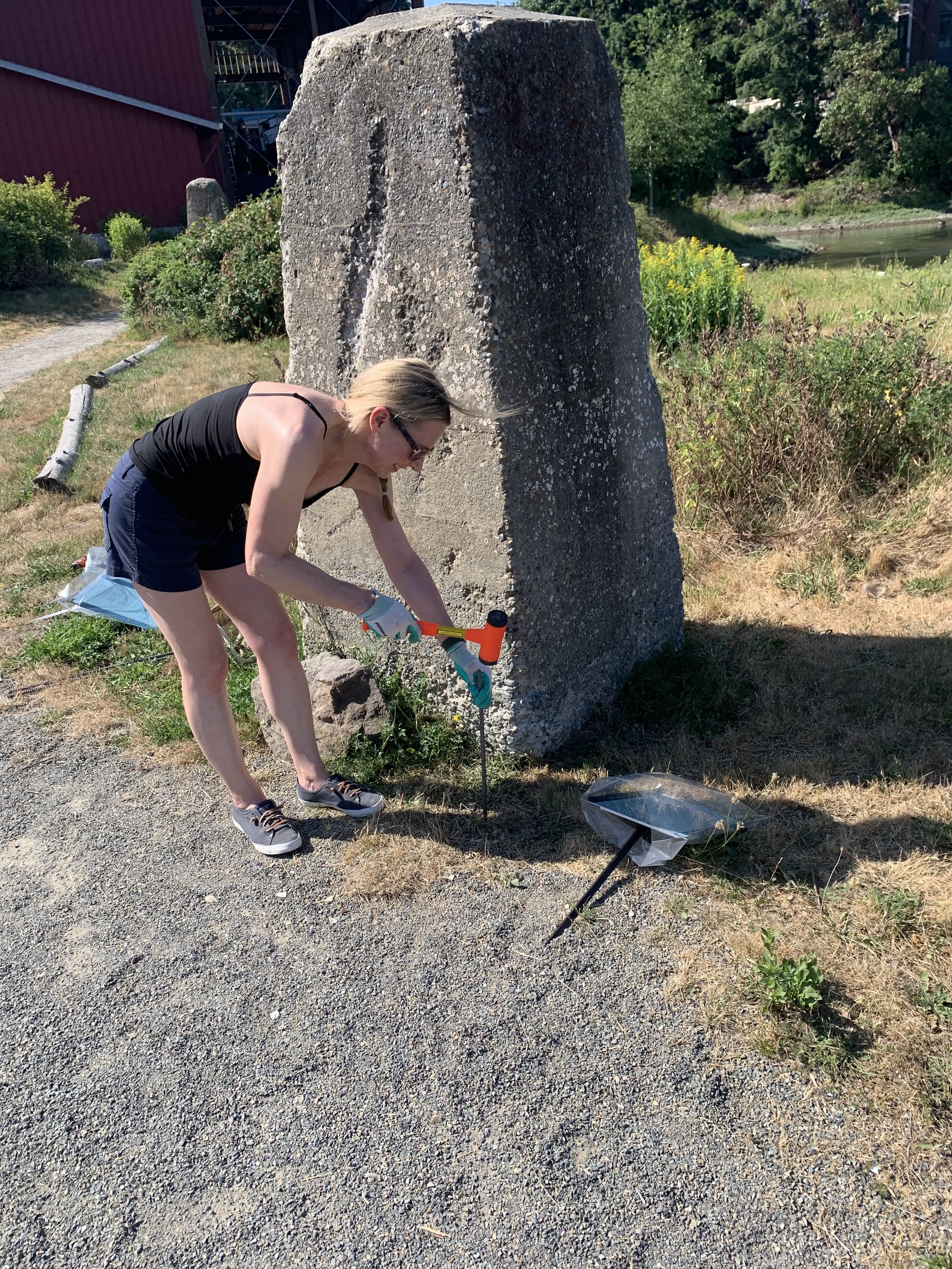
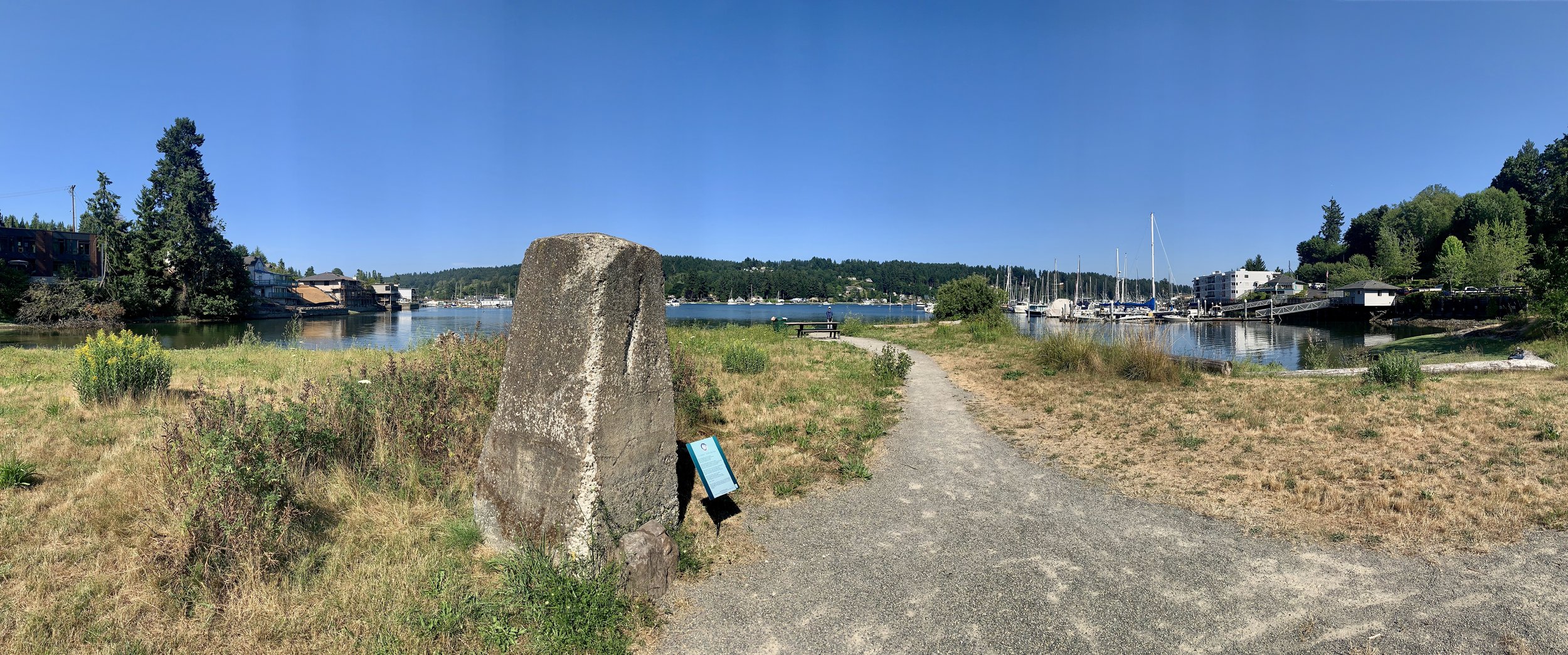

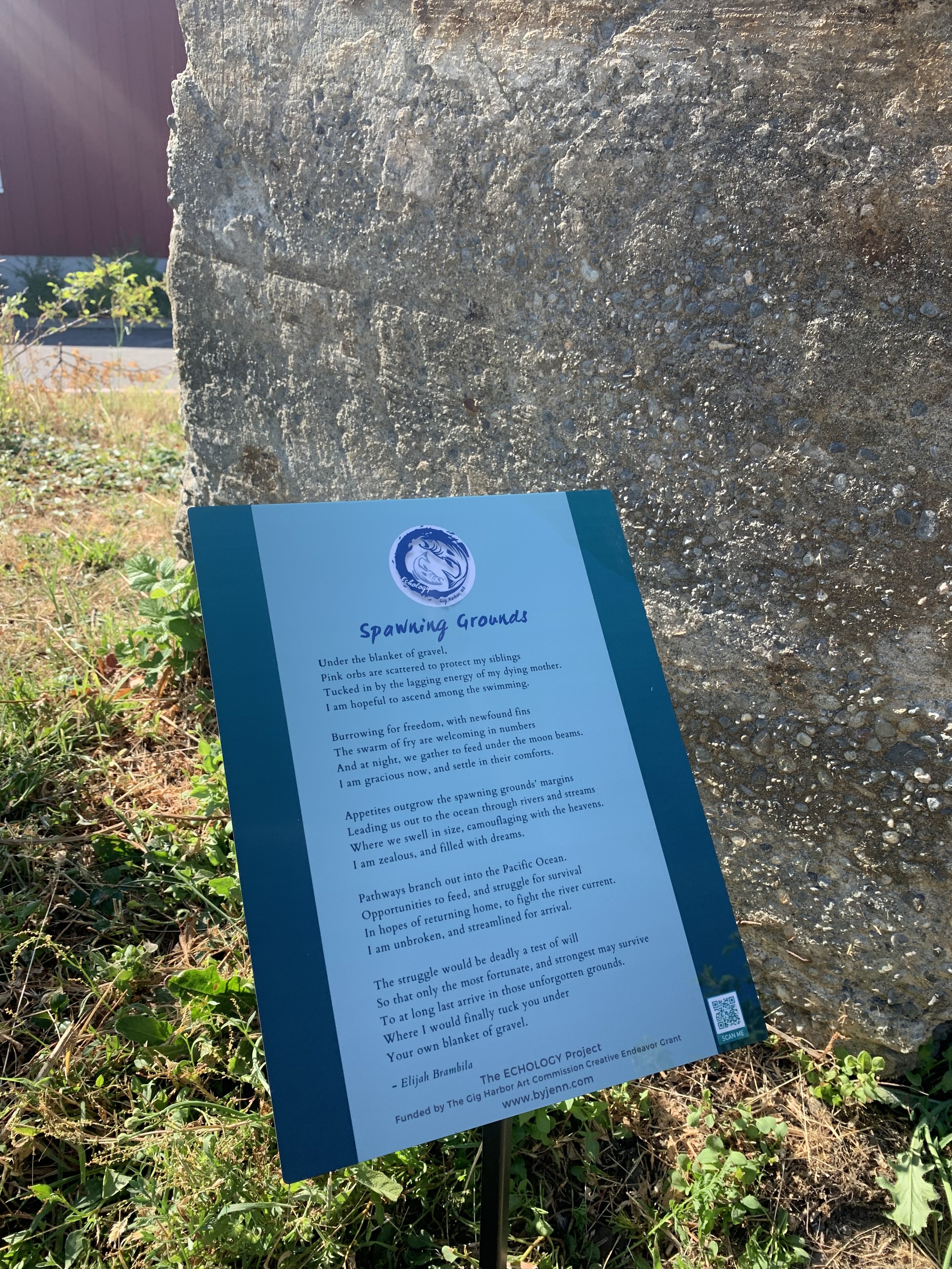

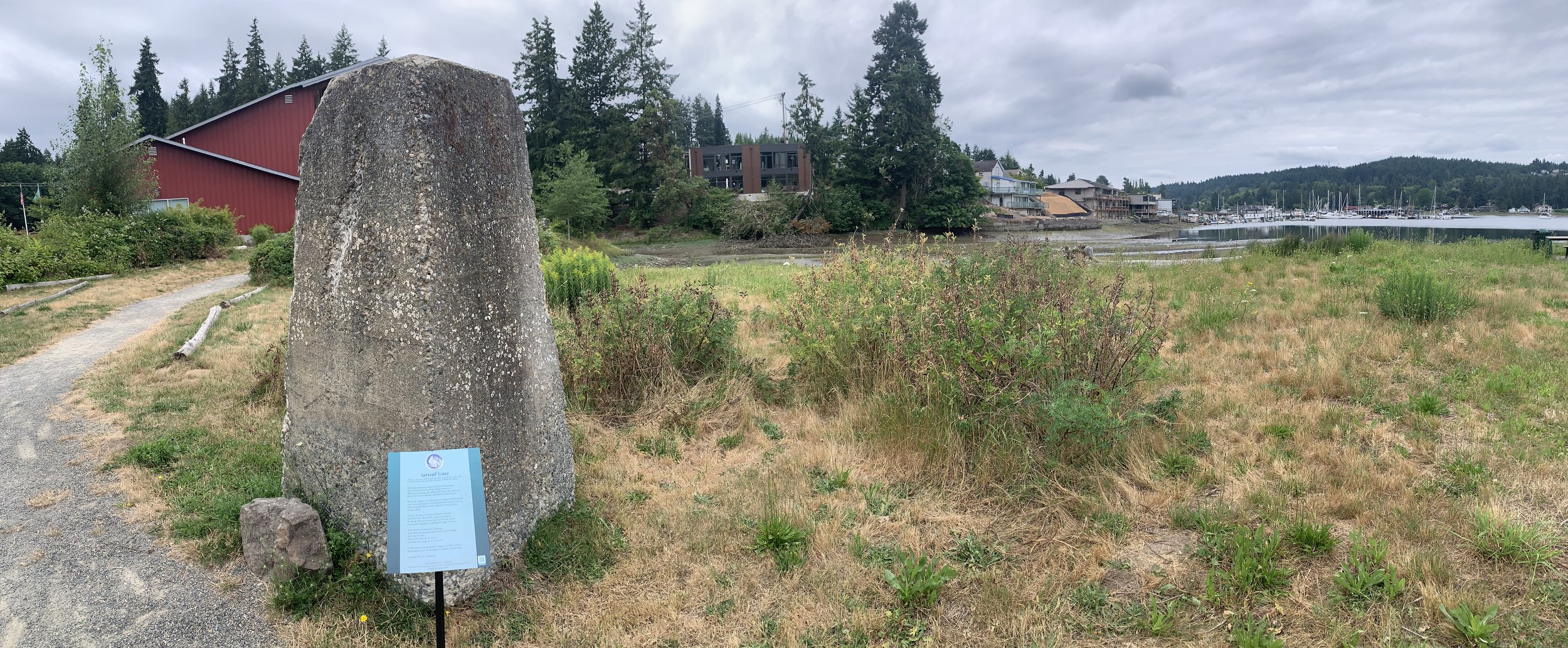
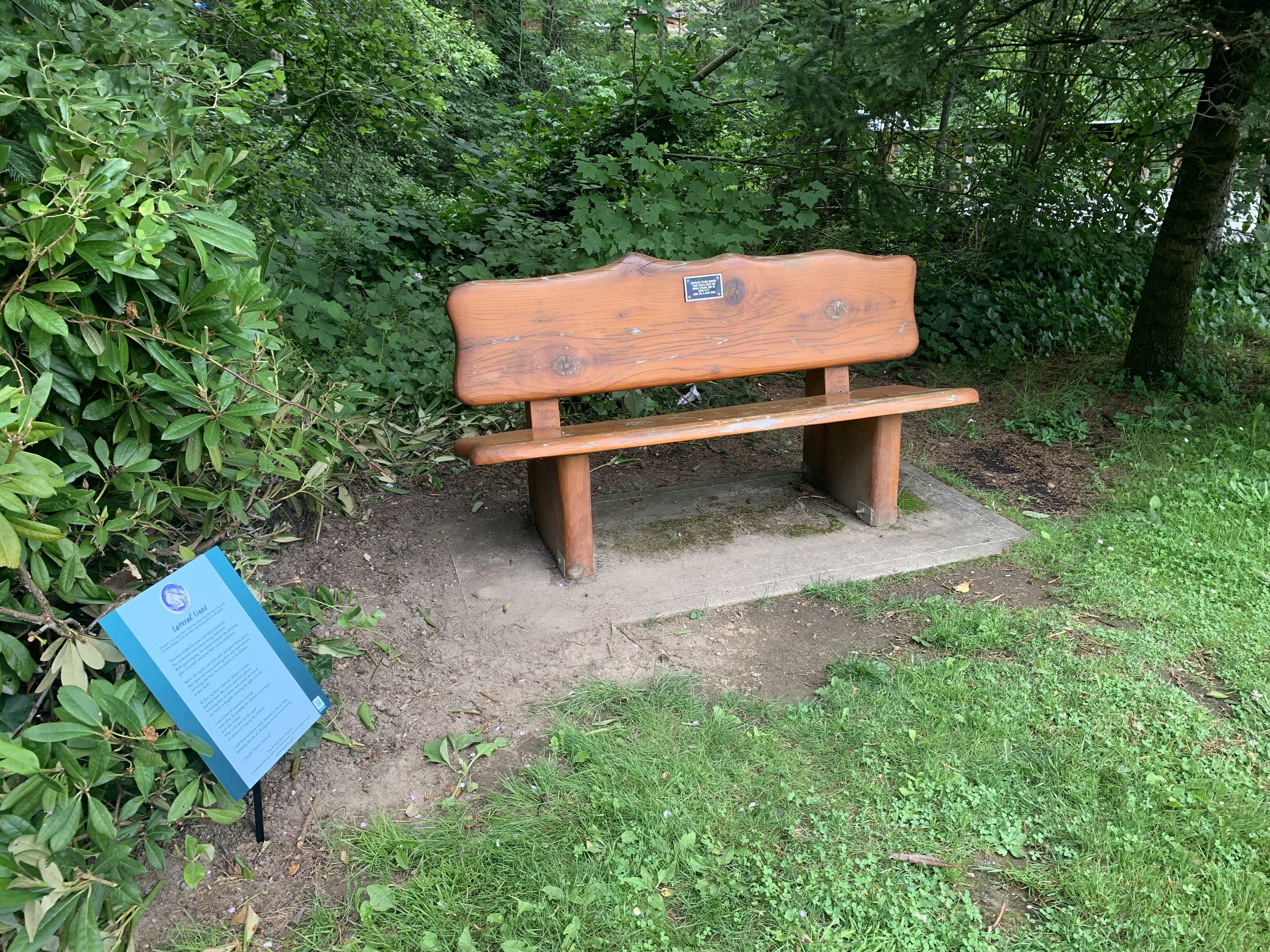
Learn more about the Lushhshootseed language: PuyallupTribalLangauge.org
pədtayil ʔə tiiɫ sčədadxʷ - Salmon Homecoming
“At our Traditional Storytelling Night we shared the story of ‘The Little Silver Salmon’ and sang and danced to Ty Satiacum’s song ‘The Salmon Homecoming.’ The dance was created by Yvette Duenas. The dance represents the salmon’s journey, getting caught in the nets of tribal fishermen, the fishermen pulling in the nets and catching the salmon, and the fishermen cleaning the salmon off. All giving honor and thanks to our incredibly valuable salmon.”
UNIQUE CHARACTERISTICS
Spawning males typically grow an elongated snout or kype. The structure develops in the weeks prior and during migration to spawning grounds.
Teeth: The male chum salmon develop sharp, canine-like teeth during spawning to defend and attack other salmon on the spawning grounds.
Anadromous: They live in both freshwater and saltwater.
Pacific salmon are distantly related to Atlantic salmon but they can not inter-breed as these species have different numbers of chromosomes.
FEDERAL PROGRAMS PROTECTING SALMON
Pacific Coast Salmon Recovery Fund
Environmental Protection Agency’s (EPA) Geographic Area Program
About Chum Salmon
(Oncorhynchus keta)
Also called: T-zum, Dog, Keta, Silverbright
Name origin: The name Chum comes from the Chinook Jargon term "tzum" meaning "spotted" or "marked." Keta comes from the Evenki language of Eastern Siberia. (Chinook Jargon is an extinct pidgin, a simplified form of a language used for communication between people not sharing a common language. It is composed of elements from Chinook, Nootka, English, French, and other languages.)
Chum salmon are anadromous fish, meaning they live in both fresh and saltwater. They are conceived and born in rivers, migrating to saltwater to feed and grow before returning to freshwater to spawn. Throughout the process, they are vulnerable to many threats including blocked spawning grounds and habitat degradation caused by dams. Two runs of chum salmon are listed as threatened under the Endangered Species Act.
WEIGHT: 8 to 15 pounds on average, but can weigh up to 45 pounds
LIFESPAN: About 4 years
LENGTH: Up to 3.6 feet
THREATS: Rising stream and river temperatures, dams, habitat destruction, pollution and natural predators
REGION: West Coast
REPRODUCTION: Semelparous (a single reproductive episode before death). Once dead, they become food and nutrients in the freshwater ecosystem.
PREDATION: Seals, orcas, humans, river otters, birds of prey and bears.
PROTECTED STATUS: ESA (Endangered Species Act) THREATENED, Columbia River and Hood Canal (summer-run)
POETRY WALK LOCATIONS
Donkey Creek Park
8714 North Harborview Drive Gig Harbor, WA 98332
Austin Estuary Park
4009 Harborview Drive Gig Harbor, WA 98332
Harbor History Museum
4121 Harborview Drive Gig Harbor, WA 98332
Meet the Poets
-
Rena Priest
Rena Priest is an enrolled member of the Lhaq’temish (Lummi) Nation. She has been appointed to serve as Washington State's Poet Laureate for the term of April 2021-2023.
She is a recipient of the Vadon Foundation Fellowship, and an Allied Arts Foundation Professional Poets Award. Her debut collection, Patriarchy Blues was published by MoonPath Press and received an American Book Award.
Her second collection, Sublime Subliminal is available from Floating Bridge Press. Individual poems are featured at Poets.org, Poetry Northwest, A Dozen Nothing, and elsewhere. She is a National Geographic Explorer (2018-2020) and a Jack Straw Writer (2019). Learn more at www.RenaPriest.com.
CYCLOID, FOCUS, AND CIRCULI
(Excerpt)
Growth on the scale starts at the focus…
Circuli… are similar to rings on a tree.
-Alaska Department of Fish & Game
A salmon is a song sung in rounds
a series of concentric circles
like a raindrop in the sea,
rippling out and returning.
A series of concentric circles,
a chorus and a verse
rippling out and returning
in a shining body of treasure.
-

Elijah Brambila
My name is Elijah Brambila, and I attend Peninsula High School as a graduating senior. I currently have not applied to any universities, but am planning on finishing my associates degree the year after high school graduation through Tacoma Community College.
I've utilized creative writing to express my ideas for as long as I've had the ability to spell. Through that expression, I was able to find poetry as an interest, and even a way to publicly read my literary creations.
SPAWNING GROUNDS(Excerpt)
Under the blanket of gravel,
Pink orbs are scattered to protect my siblings
Tucked in by the lagging energy of my dying mother.
I am hopeful to ascend among the swimming.
Burrowing for freedom, with newfound fins
The swarm of fry are welcoming in numbers
And at night, we gather to feed under the moon beams.
I am gracious now, and settle in their comforts.
-

Lydia K. Valentine
Lydia K. Valentine is a playwright and poet, director and dramaturg, editor and educator. Her proudest accomplishment, though, is being a mom to two creative, intelligent, and caring individuals and activists. In her own writing and the projects to which she contributes through Lyderary Ink, Lydia seeks to amplify the voices of those who are often stifled, ignored, and marginalized in what has been the accepted narrative of the United States.
Lydia’s first poetry collection, Brief Black Candles, was published in November 2020 by Not a Pipe Publishing. Poems from the collection were recently showcased in the Eugene Contemporary Art exhibit, A Critical Conversation: Art, Race, Privilege, and Place (on view January 14 – March 21, 2021). Her writing has also appeared in online and print publications such as Speak, The Pitkin Review, and Shout! An Anthology of Resistance Poetry and Short Fiction. She has been the recipient of various awards and recognitions with the most recent being named the 2021-2021 City of Tacoma Poet Laureate. She was the 2017 poetry fellow serving Nuestras Pequeñas Rosas in San Pedro Sula, Honduras; recipient of the 2017 Goddard College Engaged Artist Award; and recipient of the 2021 Unsettling Dramaturgy Award.
Lydia is a faculty member of Northwest Indian College and Seattle Girls’ School. She is also a highly sought after sensitivity/authenticity reader, developmental editor, and copyeditor and has worked on publications such as the social justice and literary arts magazine Speak, books such as Rough House by Tina Ontiversos, and various projects for companies such as Agate Publishing, Forest Avenue Press, McGraw Hill, and Pearson. Website: www.LyderaryInk.com.
sčədádxʷ: həlíʔ-du-but
(Excerpt)
From our beginning, our eyes are watching.
We see the pearled tumble of our brothers and sisters.
We see the sediment of past lives passing
and we try not to suffocate in its wake.
Author's note: sčədádxʷ means salmon or sea-going trout in txʷəlšucid (Twulshootseed) or Southern Lushootseed, the primary dialect of the Suquamish, Duwamish, Snoqualmie, Puyallup, Nisqually, and Squaxin people. həlíʔ-du-but means recover, one’s soul returns in Lushootseed. Thank you to Aryana Sherman and Misti Saenz-Garcia for their help with the language.
-

Josie Emmons Turner
Josie Emmons Turner wakes every morning to hearing Gig Harbor’s birds and wildlife from her sanctuary on the Crescent Creek estuary. She sees baby salmon as they make their way out to the harbor and anxiously looks for their return home in the fall.
She was Tacoma Poet Laureate 2011 - 2013 and has been published in many regional and national journals. Her most recent project was the completion of a song cycle in collaboration with Pacific Lutheran University professor and composer Gregory Youtz. She earned her MFA in Creative Writing/Poetry from the Rainier Writing Workshop at PLU in 2007 and has taught poetry classes and workshops to youth and adults. www.JosieTurnerPoet.com
SALMON SPIRIT(Excerpt)
Before you swam out, beginning your journey,
you were egg, one of a thousand, and before
you were egg, you were old and battered,
returning home to create and die and because
you were old before you were young
you were wise and gave spirit to your
rebirth, here in this water, this place,
your human family, called Swift Water People
embraced, honored you, for you fed and nurtured
what they, by themselves, could not.
-

Brett Marlo
Brett lives the tiny life in the Great Pacific Northwest and loves it! She has a Master’s Degree in Interior Architecture + Design and is a LEED Accredited Professional in Building Design + Construction. Her company, Brett Marlo Design Build, delivers design consultation for individuals, companies and other contractors. Between design, and design build, she has the flexibility to work as either a consultant or a registered general contractor, and provides design build services to the greater South Sound region.
Brett believes strongly in quality of life and guides others to achieve this through green building techniques, energy-efficiency and sustainability. Brett believes in servant leadership; inspiring others to live and advocate for a healthy built environment. Some people say she’s a “change agent.” Brett endeavors to educate others about healthy buildings and materials. She built Tacoma’s first BuiltGreen five-star certified detached accessory dwelling unit (DADU) in 2019. Find her at www.BrettMarlo.com.
SOULFUL SALMON(Excerpt)
To live as a fish:
Is to escape the dish!
Swimming up stream
Tracking ancestral scents
Writhing against dominant forces
Challenging water, wind,
Running towards fate.
Completing the journey
The migration done
It’s mating season!
-

DL Fowler
DL Fowler graduated from the University of Southern California with a BA in Humanities and earned top honors at the Defense Language Institute, Monterey CA. He is an award winning novelist, an essayist, and a poet. Two of his novels are curated in the Lincoln Presidential Library. Find him at www.DLFowler.com.
DONKEY CREEK'S REBIRTH
(Excerpt)
Water, fish borne and born,
ran swift, ages before dominion
contorted, clogged, and interred
Nature’s course,
fish carcasses turned into dams,
water, an ooze, a gurgle,
a slurry of silt and decay
estranged from illumination
in the bowels of a culvert
until dawn broke at last.
-

Justin Teerlinck
Justin Teerlinck moved to the PNW from Minnesota, where he grew up, in 2011. Both the pen and the wilderness were means to escape societal demands he had difficulty adapting to from an early age. He is fascinated with culture, mood states and behavior, and how they are shaped by their environmental contexts, community mental health and subsistence agriculture as therapeutic modality. He asserts that nature should not be treated as a place to escape to, but instead as an integral part of home and everyday life—even in urban landscapes.
His literary work spans many styles and genres, especially satirical historical fiction and epistolary writing. He has published several books and numerous essays, short fiction, poetry and experimental pieces. His short works can be found at Whistling Shade, where he has been a contributing writer since 2001 and maintained a humor column since 2008. In addition to being a writer, Teerlinck is also a community mental health and wellness occupational therapist. www.DashfireDiaries.net.
THE SALMON AT MCLANE CREEK
(Excerpt)
Their spectral bodies lined the banks
Forgotten, lost, exposed and rank.
Eyes open, jaws poised mid-bite
These muddy stones arrest their flight.
-

Cathy Warner
A native Californian, and former Gig Harbor resident, Cathy Warner now lives on the shores of the Hood Canal’s Skokomish River estuary where she photographs wildlife and the sky, writes, edits, renovates homes, and sells real estate.
Cathy is editor of the forthcoming Poemographs: An Anthology, Viral Verse: Poetry of the Pandemic (2020), and author of two volumes of poetry: Home By Another Road (2019), and Burnt Offerings (2014). Cathy has been nominated for the Pushcart Prize and Best American Essays, and her fiction, memoir, and essays have appeared in dozens of journals in print and online. She holds an MFA in Creative Writing from Seattle Pacific University. Find her at www.CathyWarner.com.
MIRACLE AT DONKEY CREEK
(Excerpt)
After years at sea
pulled by nothing more
than sense and scent
gravity and memory
silvery salmon swim
through the Salish
home to natal tributaries
-

Jennifer Preston
Jennifer is an award-winning professional artist, author and poet with over 20 years’ experience creating art in multiple disciplines. The public projects she develops take inspiration from history, geology and biology.
Her book WA IS WATER: AN INTIMATE PORTRAIT is a collection of poems, photos and facts about the unique role of water in Washington State. The project won the Tacoma Artist Initiative Program grant and an Independent Publishers Award Gold Medal.
Her passion is creating opportunities for collaborative art in the community with a focus on the mind/body connection and environmental concerns. Find her at: www.byJenn.com.
LATERAL LINES
(Excerpt)
Fish have a sense organ called a lateral line located along both sides of their body. It is akin to having a sixth sense, where sight, hearing and touch work together.
They have reached the ocean’s end, turn-around-time.
The undeniable buried deep, brings them back.
With quiet longing, the salmon swim past the glittering
glass of western windows, their unseen inhabitants.



